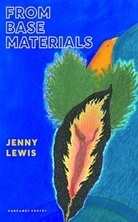Review of From Base Materials by Jenny Lewis, pub. Carcanet 2024

they can’t get the taste of terracotta
out of their mouths
they know they came from mud
that only yesterday
they were a substance
to be walked on – “Maker”
What comes most strongly through this collection is a preoccupation with what we are, where we came from and what we shall become. It is haunted by Old Testament and Eastern myths, the quest of Gilgamesh and the meditations of Omar Khayyam. As always with re-imaginings, the changes the author makes to her original tell us a lot about where she is coming from. For instance, in the “Wake!” poems, a “re-imagining” of the Rubaiyat, she renders the lines “And in your joyous errand reach the spot/where I made One” as “find the quiet spot where I became one with the universe”. This has to be a conscious divergence; Fitzgerald, and, if memory serves, Omar, was using the phrase “where I made One” to mean “where I was present” (as in “he made one of the party”), but Lewis gives it a pantheistic, or perhaps atomistic, turn, reminiscent of Wordsworth’s rocks and stones and trees.
The same interconnectedness happens in “Fox in a Frosty Field”, where “grief connects with other griefs, unmanageable and random, they cluster, form chains like protein”. This is a meditation on memories and experiences, how they shape and alter each other and even appropriate each other’s effects, so that the grief we cannot express for one loss is transferred to some other event:
How that fox on the road to the garden centre had a ruff of its own red innards round its neck.
How I cried for it, and also for my mother-in-law who I once helped to buy a fur stole.
It may also not be fanciful to see this fascination with interconnectedness in the collection’s formal aspects; the repetitions, patterns of rhyme, chain-forms like the pantoum. Lewis uses this kind of form very skilfully, as in “Fair Ground”, where the deceptive simplicity of what is almost a nursery rhyme masks a dark and serious point.
The men are riding the roundabout.
Their bearded faces go up and down.
It’s such a laugh, they giggle aloud.
Their eyes glitter with harmless fun.
their bearded faces go up and down.
Happy as children let out of school.
Their eyes glitter with harmless fun.
They love to go on the ferris wheel.
Happy as children let out of school.
Only boys are allowed to be scholars.
They love to go on the ferris wheel.
Girls are mourning their books and rulers.
And how artful that title, not “Fairground” but “Fair Ground”, typical of this poet’s exactness.
This poem also demonstrates how, despite its mythological roots, the collection is also very conscious of contemporary events. Indeed in “How can we comfort each other when we can’t comfort them”, the last sentence is alarmingly prescient:
How can we comfort each other if we can’t comfort them?
What right have we to be living when they are only offered
a choice of endings
by whatever powers of hell come out of the dark pavilions of the terrible,
death-delivering sky – and I am being forced to allow it? Let there be no
building on the mass graves of innocents.
I admit to not “getting” what the poem “Another way of saying it” is trying to do, and in “Guinevere”, the image of her “polishing the round table, over and over, wanting praise” threw me a bit; I can’t help thinking queens had staff for that sort of thing. But this is peripheral to the collection’s powerful, haunting theme. The last poem, “The Bat”, harks back to an earlier poem that ends “We are the stuff of unexploded stars”, a line that again put me in mind of Lucretius and the atomists:
you died there alone and this is true of all flesh,
whether in or out of the sun, the end comes
and with the end
comes darkness, and with darkness
the beginnings of stars.



